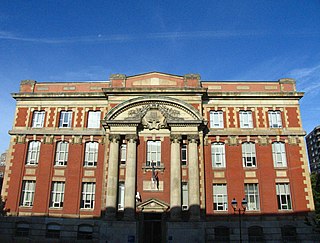Related Research Articles

French is a Romance language of the Indo-European family. It descended from the Vulgar Latin of the Roman Empire, as did all Romance languages. French evolved from Gallo-Romance, the Latin spoken in Gaul, and more specifically in Northern Gaul. Its closest relatives are the other langues d'oïl—languages historically spoken in northern France and in southern Belgium, which French (Francien) largely supplanted. French was also influenced by native Celtic languages of Northern Roman Gaul like Gallia Belgica and by the (Germanic) Frankish language of the post-Roman Frankish invaders. Today, owing to the French colonial empire, there are numerous French-based creole languages, most notably Haitian Creole. A French-speaking person or nation may be referred to as Francophone in both English and French.

Quebec French, also known as Québécois French, is the predominant variety of the French language spoken in Canada. It is the dominant language of the province of Quebec, used in everyday communication, in education, the media, and government.

The Office québécois de la langue française is a Quebec public provincial organization established on 24 March 1961, by the Liberal government of Jean Lesage. Attached to the Ministère de la Culture et des Communications(Ministry of Culture and Communications), its initial mission, defined in its report of 1 April 1964, was "to align on international French, promote good Canadianisms and fight Anglicisms ... work on the normalization of the language in Quebec and support State intervention to carry out a global language policy that would consider notably the importance of socio-economic motivations in making French the priority language in Quebec".

François Cheng is a Chinese-born French academician, writer, poet, and calligrapher. He is the author of essays, novels, collections of poetry and books on art written in the French language, and the translator of some of the great French poets into Chinese.
The Charter of the French Language, also known in English as Bill 101, Law 101, or Quebec French Preference Law, is a law in the province of Quebec in Canada defining French, the language of the majority of the population, as the official language of the provincial government. It is the central legislative piece in Quebec's language policy, and one of the three statutory documents Quebec society bases its cohesion upon, along with the Quebec Charter of Human Rights and Freedoms and the Civil Code of Quebec. The Charter also protects the Indigenous languages of Quebec.
This article presents the current language demographics of the Canadian province of Quebec.
Francization or Francisation, also known as Frenchification, is the expansion of French language use—either through willful adoption or coercion—by more and more social groups who had not before used the language as a common means of expression in daily life. As a linguistic concept, known usually as gallicization, it is the practice of modifying foreign words, names, and phrases to make them easier to spell, pronounce, or understand in French.

France has one official language, the French language. The French government does not regulate the choice of language in publications by individuals, but the use of French is required by law in commercial and workplace communications. In addition to mandating the use of French in the territory of the Republic, the French government tries to promote French in the European Union and globally through institutions such as La Francophonie. The perceived threat from Anglicisation has prompted efforts to safeguard the position of the French language in France.
The Commission of Inquiry on the Situation of the French Language and Linguistic Rights in Quebec was established under the Union Nationale government of Jean-Jacques Bertrand on December 9, 1968.

Quebec Sign Language, known in French as Langue des signes québécoise or Langue des signes du Québec (LSQ), is the predominant sign language of deaf communities used in francophone Canada, primarily in Quebec. Although named Quebec sign, LSQ can be found within communities in Ontario and New Brunswick as well as certain other regions across Canada. Being a member of the French Sign Language family, it is most closely related to French Sign Language (LSF), being a result of mixing between American Sign Language (ASL) and LSF. As LSQ can be found near and within francophone communities, there is a high level of borrowing of words and phrases from French, but it is far from creating a creole language. However, alongside LSQ, signed French and Pidgin LSQ French exist, where both mix LSQ and French more heavily to varying degrees.

Aostan French is the variety of French spoken in the Aosta Valley, Italy.

Egyptians speak a continuum of dialects. The predominant dialect in Egypt is Egyptian Colloquial Arabic or Masri/Masry, which is the vernacular language. Literary Arabic is the official language and the most widely written. The Coptic language is used primarily by Egyptian Copts and it is the liturgical language of Coptic Christianity.
Bill 63, formally the Loi pour promouvoir la langue française au Québec, was a language law passed in 1969 in Quebec, Canada.
The Walloon Movement traces its ancestry to 1856 when literary and folkloric movements based around the Society of Walloon language and literature began forming. Despite the formation of the Society of Walloon Literature, it was not until around 1880 that a "Walloon and French-speaking defense movement" appeared, following the linguistic laws of the 1870s. The movement asserted the existence of Wallonia and a Walloon identity while maintaining the defense of the French language.
Charles Castonguay is a retired associate professor of Mathematics and Statistics at the University of Ottawa.
Josette Rey-Debove, was a French lexicographer and semiologist. She was the first female lexicographer in France, and held many prominent posts in this field, where she used her influence to promote feminist changes to French language usage. Her husband, Alain Rey, was also her colleague.

France Martineau is a professor and a Canadian linguist. Martineau is an expert in Canadian French linguistics and considered a leader in historical sociolinguistics as well as a pioneer in the digital humanities. Martineau presently holds the University of Ottawa Research Chair Le français en mouvement: Frontières, réseaux et contacts en Amérique française.

The French language became an international language in the Middle Ages, when the power of the Kingdom of France made it the second international language, alongside Latin. This status continued to grow into the 18th century, by which time French was the language of European diplomacy and international relations.
Jean-Claude Corbeil, was a Canadian linguist and lexicographer. He served as head of the linguistic department at the Office québécois de la langue française from 1971 to 1977 and oversaw the introduction of Quebec's language laws during that decade. He also co-authored several visual dictionaries for Scholastic Corporation, Macmillan Publishers, Firefly Learning, and Merriam-Webster.
The Act to amend the Charter of the French Language is a Quebec amending act introduced by the Landry government in 2002, which made adjustments to several provisions of Quebec's language policy. Its main objective was to rectify the Charter of the French Language in response to the recommendations of the Estates-General on the Situation and Future of the French Language in Quebec.
References
- French, a language for everyone. A new strategic approach centred on the citizen in society - English summary of the final report
- Le français, une langue pour tout le monde, final report of the Estates-General on the Situation and Future of the French Language in Quebec, August 20, 2001 (PDF)
- 60 mémoires présentés par divers organismes à la Commission des États généraux sur la situation et l'avenir de la langue française au Québec (PDF)